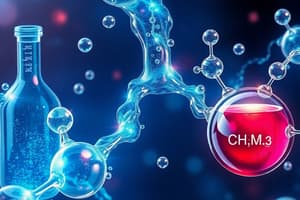Podcast
Questions and Answers
Which type of reactions involve the addition of atoms or groups of atoms to a molecule?
Which type of reactions involve the addition of atoms or groups of atoms to a molecule?
- Substitution reactions
- Radical addition reactions
- Nucleophilic substitution reactions
- Electrophilic addition reactions (correct)
What are amines?
What are amines?
- Compounds that replace atoms in a molecule
- Compounds that add atoms to a molecule
- Nitrogen-containing compounds that can be basic, neutral, or acidic (correct)
- Nitrogen-free compounds
Which of the following is NOT a biological function of organic compounds?
Which of the following is NOT a biological function of organic compounds?
- Structural components in living organisms
- Involvement in metabolic processes
- Formation of inorganic materials (correct)
- Energy storage and transfer
In which industry are organic compounds primarily used for creating medicines and drugs?
In which industry are organic compounds primarily used for creating medicines and drugs?
What is a characteristic feature of substitution reactions?
What is a characteristic feature of substitution reactions?
Study Notes
Organic Chemistry: Exploring the Building Blocks of Life
Organic chemistry is a branch of chemistry that focuses on the study of carbon-containing compounds, including their structure, properties, and reactions. This dynamic field, often referred to as the "chemistry of life," has a profound impact on various aspects of human life, ranging from the pharmaceutical industry to everyday materials.
Carbon: The Central Atom
Carbon, with its tetravalent nature, serves as the foundation of organic chemistry. A carbon atom can bond with up to four other atoms or groups, providing abundant possibilities for forming complex molecules. The bonding patterns and arrangements of carbon atoms in organic compounds lead to an almost infinite variety of structures and properties.
Functional Groups
Organic compounds are classified by the presence of certain functional groups, which are specific groups of atoms within a molecule that impart characteristic properties. Common functional groups include:
- Alkanes, alkenes, and alkynes: These are hydrocarbons, consisting only of carbon and hydrogen.
- Alcohols: Containing an -OH group, alcohols are polar compounds that can form hydrogen bonds.
- Carboxylic acids: Containing a -COOH group, carboxylic acids are acidic and can lose a proton to form carboxylate ions.
- Aldehydes and ketones: Containing a carbonyl group (C=O), these compounds are important in organic synthesis and biological systems.
- Amines: Containing -NH₂, -NH-, or -NR₂ groups, amines are nitrogen-containing compounds that can be basic, neutral, or acidic.
Mechanisms of Reaction
Organic reactions often proceed through specific reaction mechanisms. Two primary mechanisms include:
-
Substitution Reactions: Reactions in which an atom or group of atoms replace another atom or group of atoms in a molecule. Substitution reactions can be classified as nucleophilic substitution reactions or electrophilic substitution reactions.
-
Addition Reactions: Reactions in which atoms or groups of atoms are added to a molecule. Addition reactions can be classified as nucleophilic addition reactions, electrophilic addition reactions, or radical addition reactions.
Biological Significance
Organic chemistry is essential for understanding the chemistry of life, as it directly relates to the study of living organisms and their biochemical processes. Organic compounds are involved in various biological functions, including:
- Energy storage and transfer: Organic compounds like glucose and adenosine triphosphate (ATP) are essential for energy storage and transfer within living organisms.
- Structural components: Organic compounds like proteins, nucleic acids, and lipids play a crucial role in organizing and maintaining the structure of living organisms.
- Metabolic processes: Organic compounds are involved in various metabolic pathways, such as the citric acid cycle, glycolysis, and the biosynthesis of amino acids.
Applications of Organic Chemistry
Organic chemistry is a versatile field with applications in various industries, including:
- Pharmaceuticals: Organic compounds are the primary components of modern medicines and drugs.
- Materials science: Organic compounds are used to create polymers, synthetic fibers, and other materials with unique properties.
- Food industry: Organic compounds are involved in the production, processing, and preservation of food products.
- Environmental science: Organic compounds, both natural and synthetic, play a role in the environment, including pollution and biodegradation.
Organic chemistry is a dynamic and exciting field that has profound implications for our understanding of life and its applications in various industries. By exploring the world of organic chemistry, we can gain a deeper appreciation for the complexity of molecules and the processes that shape our world.
Studying That Suits You
Use AI to generate personalized quizzes and flashcards to suit your learning preferences.
Description
Dive into the world of organic chemistry, a branch of chemistry that focuses on carbon-containing compounds and their diverse structures, properties, and reactions. Explore the central role of carbon, functional groups, reaction mechanisms, biological significance, and real-world applications in pharmaceuticals, materials science, food industry, and environmental science.




